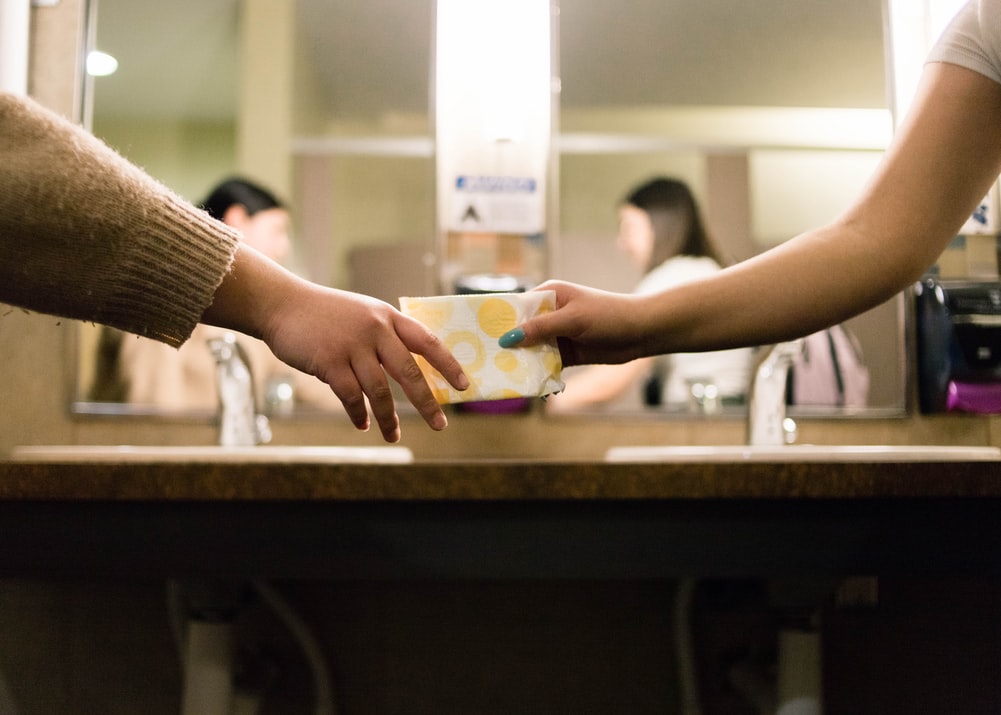
Scotland first country to provide free sanitary products: ‘I hope that Belgium follows Scotland in this law’
Members of the Scottish parliament voted for a law where everyone gets free access to sanitary products, including tampons, pads and cups. This is the result of a 2017 study, where it was found that 1 out of 10 girls can’t afford period products. ‘Why should women spend so much money on something they don’t choose?’, says Thijs Smeyers, Policy & Advocacy Coordinator at Caritas, an organization that fights poverty.
The UK Plan International study on Period Poverty found that 1 out of 10 girls and women regularly can’t afford sanitary products, and 1 out of 5 has ever used less suitable products, like toilet paper or extra underwear, to get through their period. This was a clear sign for the Scottish government to find a solution for these statistics. The first step was to give access to free sanitary products in schools, they now decided to make it free for all.
Scottish c:card
The first part of the new Scottish law makes it mandatory for all public institutions to provide free sanitary products, including tampons and pads. The second part makes it possible to individually request sanitary products via a c:card, this card is already used to get free condoms in Scotland, and is easily accessible by registering with your name and date of birth. You will also have the choice to pick up free sanitary products in service centers or pharmacies if you possess the c:card.
Gender equality
‘The new Scottish law benefits gender equality’, explains Smeyers, who was the first one to study period poverty in Flanders with Caritas. ‘I find it positive that everyone has free access to sanitary products, and in the meantime, they tackle the broader societal debate about inequality. You create a solidarity mechanism between men and women, where it is finally fully understood that it’s natural to menstruate. Why should women spend so much money on something that’s natural, something they don’t choose? And why do most men think that that’s normal? In Flanders, we still got work to do. I hope that Belgium follows Scotland in this law very soon.’
Shame
Smeyers is convinced that society looks at menstruation with shame: ‘Talking about this subject would make the shame go away, and enable us to look at it as something normal and usual. Unfortunately, talking about periods doesn’t happen a lot. I have heard multiple times that girls are ashamed to go to the school reception to ask for a period pad, this makes the poverty problem even worse.’
Lindsey, 20 years old and student Health Care Management, confirms this. ‘When I was younger, my period was irregular, so it happened that I didn’t have anything with me. There were often other people that could help me, but this wasn’t always the case. Providing free sanitary products in public spaces can be a solution for these shameful and uncomfortable situations.’
#timeformyperiod
Flo Windey, content creator at Studio Brussel, already made an appeal to send an email to Wouter Beke, member of CD&V (Flemish Christian-democratic political party) and minister of Welfare and Public health, to ask for a solution. ‘If we ask Beke’s cabinet to start looking for a solution, they say that they don’t have time, maybe because of COVID-19? I understand that, but periods don’t stop during a pandemic. Poverty still exists.’ She then asked her followers to send an email with the hashtag #tijdvoormijnregels (#timeformyperiod) to Beke’s cabinet. ‘Tell them why it’s so important. If they don’t have time for it right now, maybe tomorrow? Or the day after? Or next week?’
View this post on Instagram
Text: Jilke Tielemans, photo: © Annika Gordon (Unsplash)



